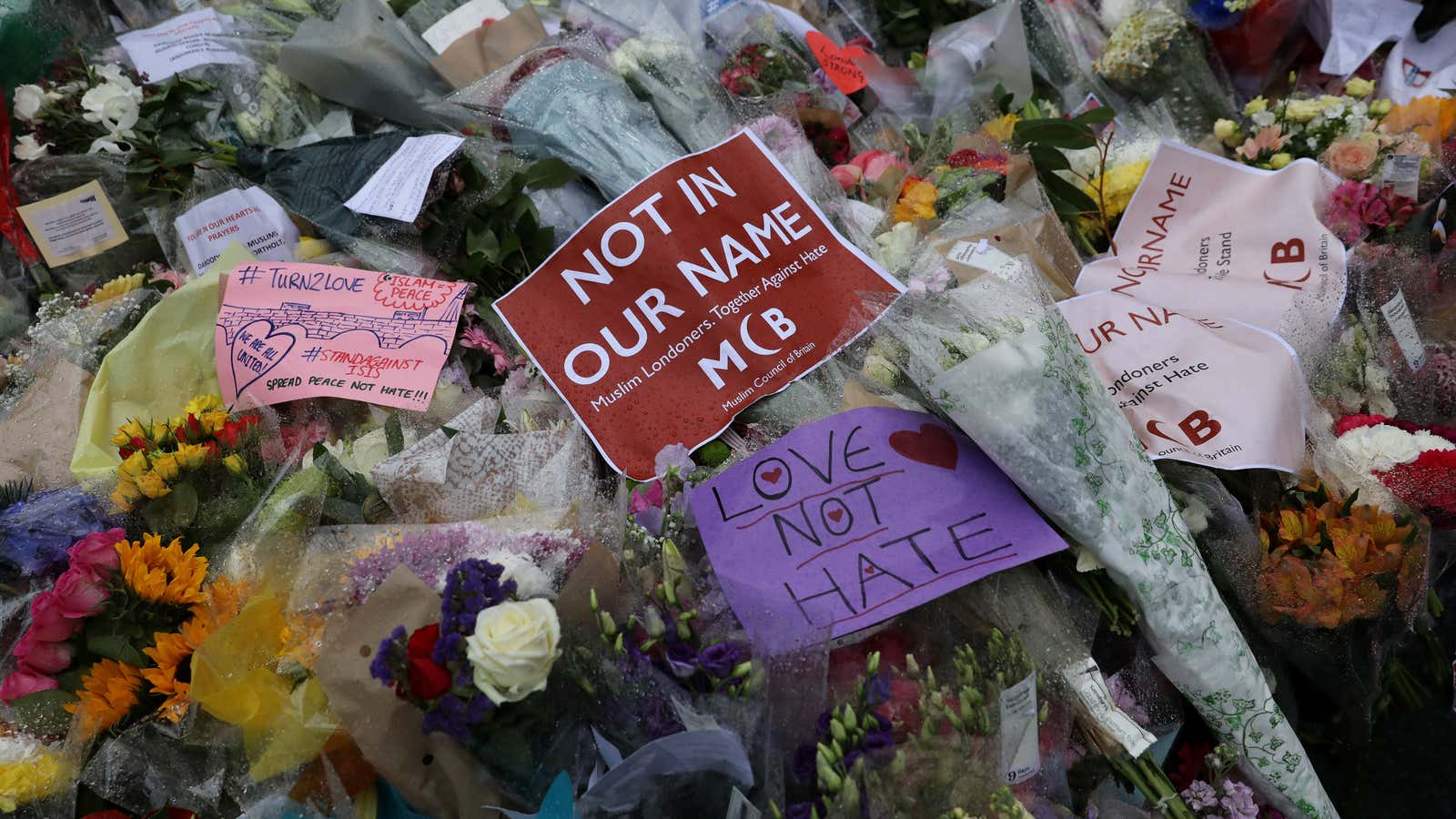In the wake of the terrorist attack on London Bridge, Theresa May said that recent attacks “are bound together by the single, evil ideology of Islamist extremism that preaches hatred, sows division, and promotes sectarianism.”
In 2015, the prime minister had written that where “non-violent extremism goes unchallenged, the values that bind our society together fragment”. Going one step further, in its 2017 manifesto, May’s Conservative party called for a new approach where: “We will consider what new criminal offences might need to be created… to defeat the extremists.”
What this push for new legislation targets is not the criminal behaviour of violence, but the ideology behind it. This is based on the problematic assumption that criminalising the motivations behind an action can prevent it from happening: but my research suggests that the opposite may well be the case.
Under UK legislation terrorism is defined as violent acts committed to advance a political, ideological, or religious cause. This means that individuals engaging in such attacks are doing so to communicate and bring about some form of political transformation. Violent attacks are done for a political cause, to advance an ideological goal.
The crucial question then is how can states and wider civil society create a context whereby non-violent forms of political expression are considered preferable to such violent alternatives. In other words, how can we make 21st century politics function in a way that draws people with these views in, rather than alienates and isolates them?
The rush to criminalize
In new research I’ve published on negotiations, I discuss how such issues are often due to the orientation of the criminal justice system. Instead of just criminalizing political violence, states frequently criminalize a much broader range of non-violent forms of political expression.
Because politicians like May link certain ideologies to acts of violence, these ideologies are regarded as being just as criminal. All corresponding non-violent expressions of these ideologies—such as certain extreme interpretations of Islam—are to be considered in like terms, as a “pernicious ideology”, as May’s predecessor David Cameron stated following the terror acts in Brussels in 2016.
For instance, during the conflict in Northern Ireland, Sinn Féin was censored, as were many advocating their political ideology. This led to a silencing of the political debate. Those challenging the violence of the IRA, but advocating for their goals—a united Ireland—were frequently labelled as terrorist sympathisers. For instance the former leader of the moderate nationalist Social Democratic and Labour Party (SDLP), John Hume, notably stated: “Listening to honourable members opposite one would think that it [the pursuit of Irish unity] was a crime.”
Cutting off dialogue
But criminalizing non-violent forms of expression undermines dialogue—a crucial component of resolving conflict in all forms. If people don’t talk to one another they will have a much more limited understanding of what “the other” side actually wants. It will mean each side sees their goals in opposition to other, and any gains they make as the others’ losses.
Terrorism itself is an expression of these goals, but it is at the end of a spectrum. Intervention much earlier on down the scale could possibly enable alternative pathways to resolving the political objectives. Academic interviews with a number of “radicals” in Canada revealed how the pathway into jihad is by no means linear nor predetermined. Engaging with, rather than criminalizing, those who are moving towards political violence is essential to its prevention.
When non-violent expressions of a political ideology are criminalized this links the very ideology with criminality, and with terrorism. Holding a belief, no matter how disagreeable you may find it, does not make a person a perpetrator. Media headlines after the recent terror attacks in the UK provide disturbing examples of just how demonizing such language can be. One headline in The Daily Mail read: “Another fanatic slips through the net”, while another in The Sun called one of the attackers “The Jihadi next door”.
Instead of focusing on the acts, such media coverage demonizes the individuals, creating suspicion against all those of a particular religion or culture. As a result, this alienates the very communities which counter-terrorism forces needs to work with most.
Linking those who hold illegal beliefs directly to terror may isolate and marginalize their voices and ensure that they are unable to openly express their political beliefs. Many of the murals and graffiti in Northern Ireland are illustrative of this very issue. As a former IRA prisoner explained to me as part of my research, “the state were in total control of all other expressions of citizenship”. As a result these individuals are likely to operate covertly rather than in the open, making it more difficult to engage and challenge their positions. Instead, they are reduced to simple characterizations, such as evil jihadists, closing down opportunities for dialogue rather than opening them up.
Providing legitimate and credible non-violent alternatives to terrorism may seem fanciful, but the motivations for some of these individuals often begins in their social exclusion and alienation. Addressing and engaging with these issues much earlier could help prevent violent motivations ever taking root.
This means re-orientating criminal justice so that the focus is on the illegitimacy of political violence, not the identities and individuals themselves. It could help prevent these attacks, particularly as they become more difficult to detect. Dialogue, not criminalizing non-violent forms of expression, will help prevent political violence.
This article was originally published on The Conversation. Read the original article.
